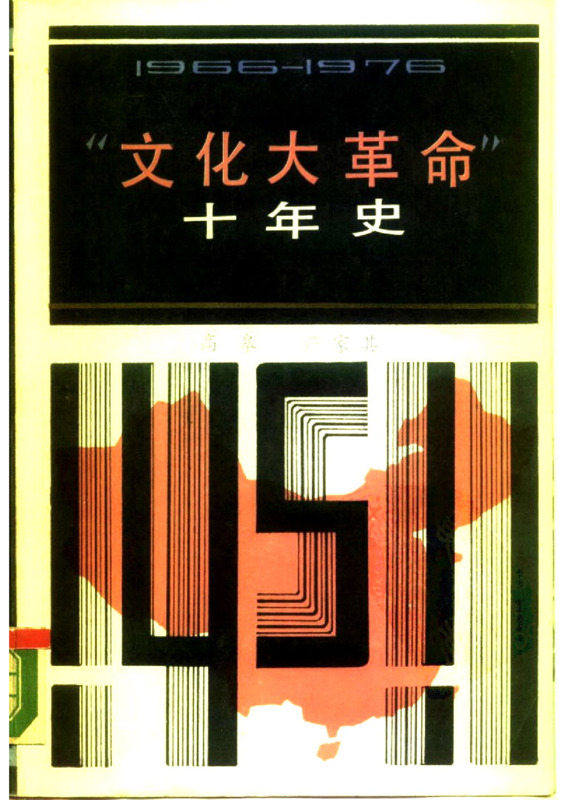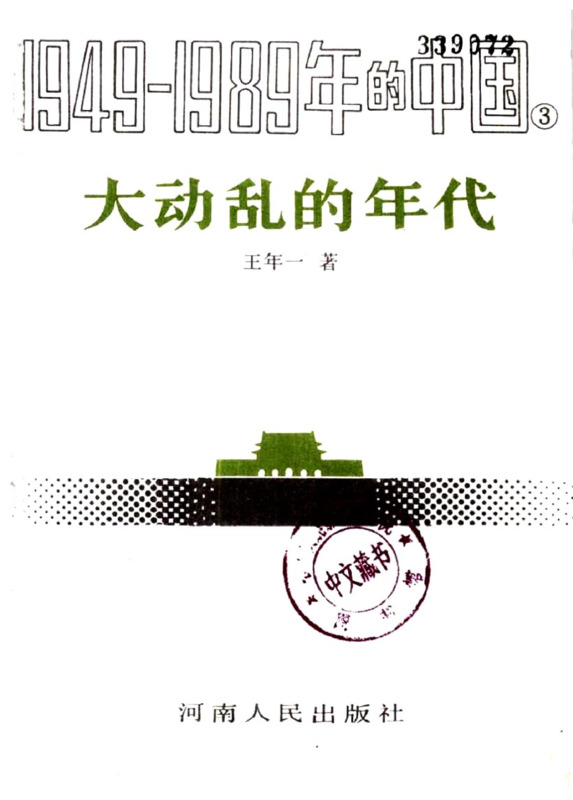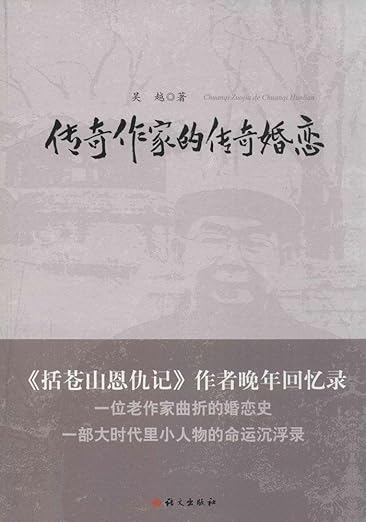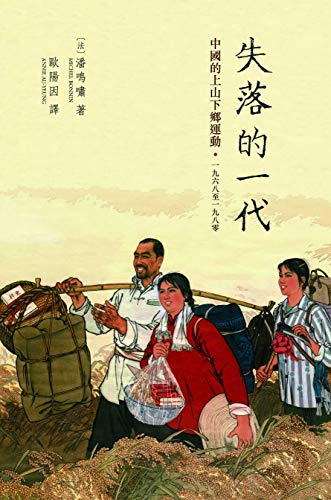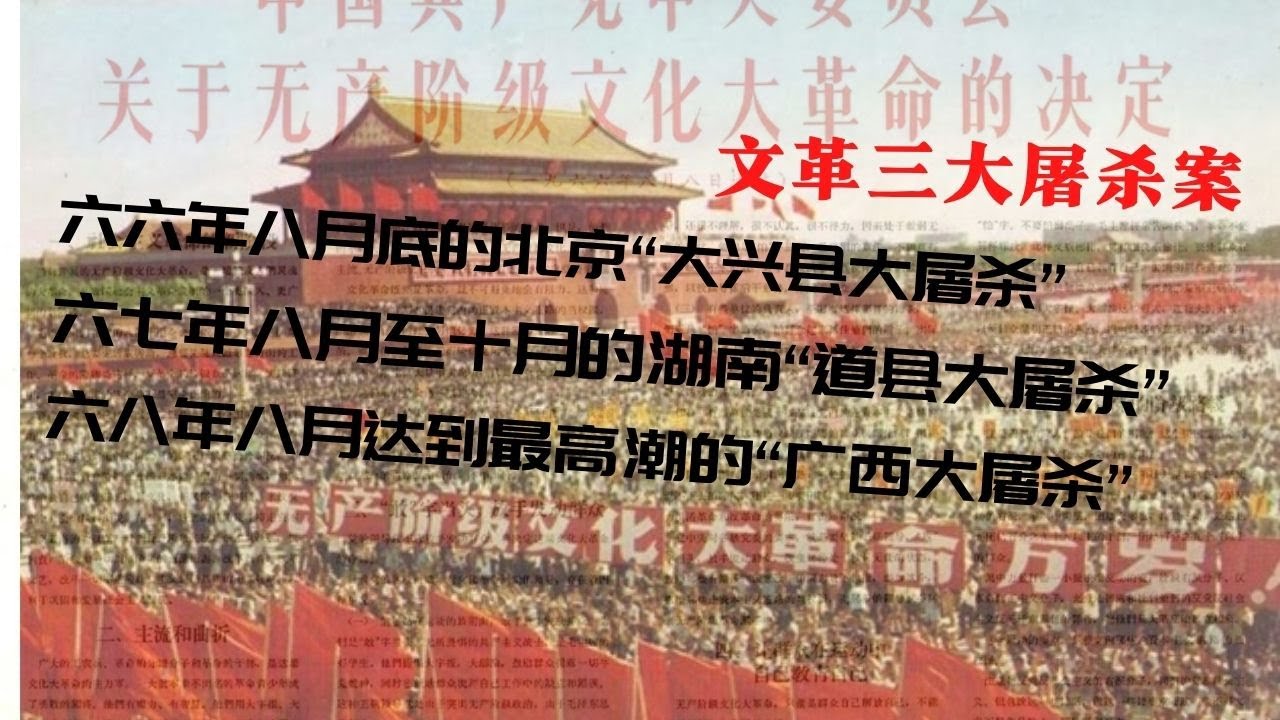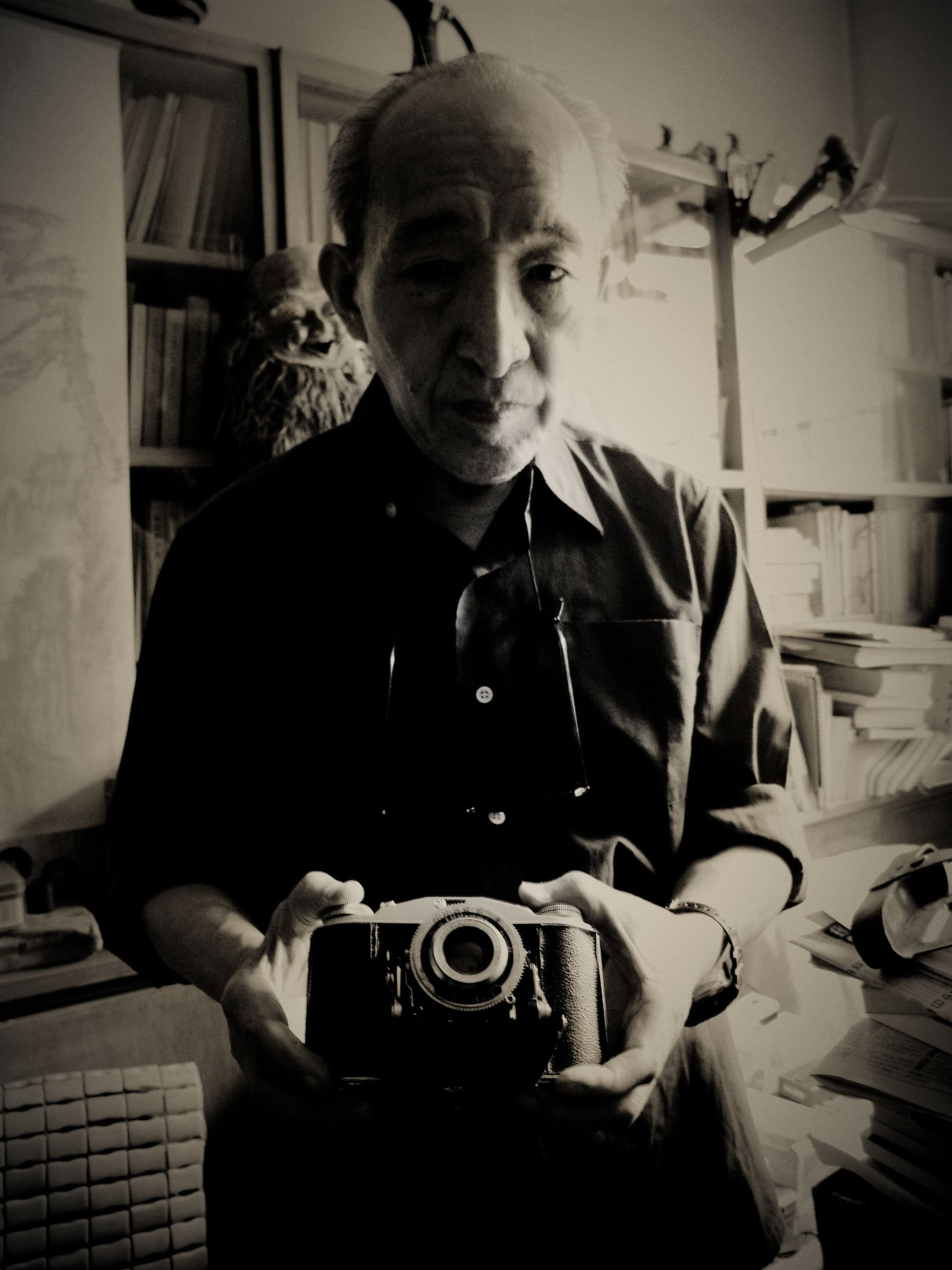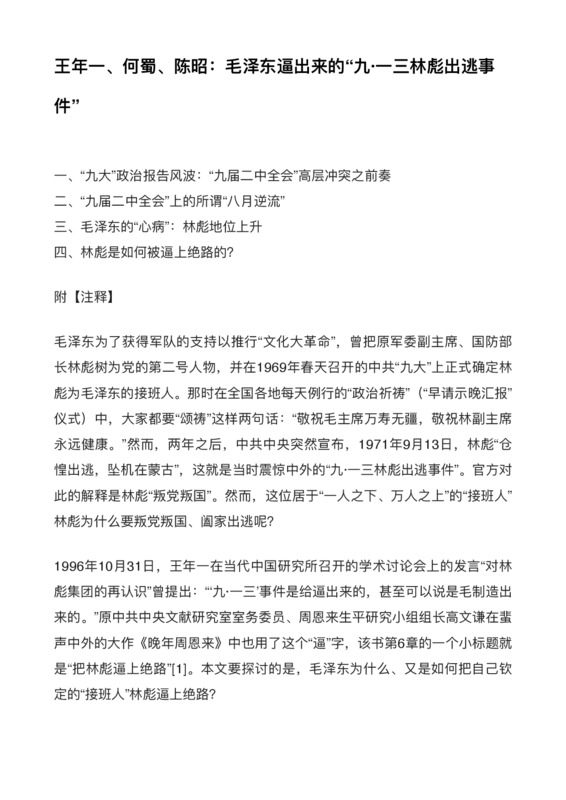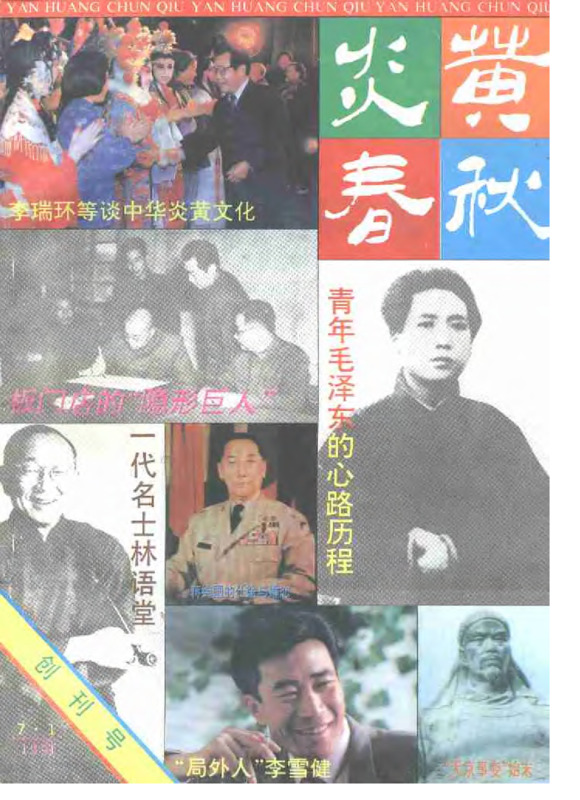Explore the collection
Showing 74 items in the collection
74 items
Book
Ten-Year History of the Cultural Revolution, The
The authors of this book, Yan Jiaqi and Gao Gao, are a married couple. Both are scholars at the Chinese Academy of Social Sciences (CASS). Yan was the first director of the Institute of Political Science at the CASS and was involved in the Political Reform Office under Premier Zhao Ziyang. The couple went into exile in the U.S. after the June 4 Incident. The book was published by the Tianjin Publishing House in 1986. With a circulation of more than one million copies, many people began to learn about the full history of the Cultural Revolution from this book.
Book
The Age of Great Unrest: China 1949-1989
The author of this book, Wang Nianyi (1932 - September 13, 2007), was an expert on the history of the Cultural Revolution. He has a clear understanding of the causes and circumstances of the Cultural Revolution. He is regarded as doing "pioneering work" in China's domestic study of the Cultural Revolution. According to Qizhi's recollection, Wang Nianyi compiled <i>Chronicle of the Cultural Revolution</i>, <i>The First Year of the Cultural Revolution</i>, <i>Dictionary of the Cultural Revolution</i>, <i>Miscellaneous Discourses on the Cultural Revolution</i>, and <i>Research Materials on the Cultural Revolution</i>, which have not been published in China.
Book
The Brothers Mingjian Xue & Yefang Sun
This book concerns two Chinese economists, Xue Mingjian and Sun Yefang. Xue Mingjian (1895-1980, former name Xue Epei, he changed his name after joining the volunteer student armies during the 1911 revolution - Mingjian (明剑) meant “to eliminate the Qing government with sword and revenge on behalf of the Ming Dynasty (剑除满清,为朱明报复)” ) was "the founder of modern Chinese national enterprise economics, the pioneer of modern national industry, a civil society activist, educator and scholar" (author's preface). He served as a delegate to the National People's Congress of the Republic of China, Senate member of the Kuomintang, and a popularly elected legislator. Sun Yefang (1908-1983, former name Xue Eguo, he changed his name out of security concern after the incident that he got arrested by KMT when he was a underground CCP member), by contrast, a member of the Communist Party of China, was an important economist in post-1949 China, who was persecuted during the Cultural Revolution and regained attention and respect after the reform and opening-up period. The author tells the story of the two brothers' very different life trajectories, while pointing out that even though they were in different political camps, their concern for and practice of humanitarianism were in fact the same.
The book was first published by China SDX Joint Publishing in 2009, and was to be reprinted by Economic Press China in 2014, but it was censored. The version in our archive is published by Boden House in 2023.
Book
The Legendary Marriage of A Legendary Writer
The author, Wu Yue, was the editor of several media including Yuwen Chubanshe. This book, as his memoir, recreates his personal destiny in different social situations, including the anti-rightist and Cultural Revolution and other special times, the frustrations of a generation of intellectuals held hostage in the political wave. The book tells the story of the author's many marriages and love affairs under special political circumstances. It also analyzes the deformity and absurdity of the political re-education through the labor system as well as the impact on humanity.
Book
The Lost Generation: China's Sending to the Countryside Movement (1968-1980)
After the outbreak of the Cultural Revolution in 1966, 1,700 Chinese urban youths were deported to the countryside from 1968 to 1980. This was an organized population transfer and a radical political movement that was named the "Going to the Countryside" movement. It was unprecedented. The movement had a profound impact on a whole generation of young people in China's towns and cities. Not only did it disrupt their lives and deprive them of education, it also affected their families and society as a whole. This book by French sinologist Michel Bonnin reveals the ins and outs of this movement. It also explores its deep imprint on China's society, politics, and economy as well as the historical place it occupies.
Book
Thirty Years of New China
Tang Degang is a historian and biographer who specializes in oral history. In the latter half of his life, he settled in the United States and taught at Columbia University and the City University of New York. In the field of history, he put forward the "Three Gorges Theory of History", which divides the change of Chinese social system into three major stages: feudalism, imperialism, and civil rule. The book was originally titled <i>Mao Zedong's Dictatorship, 1949~1976</i>, but was renamed <i>Thirty Years of New China </i> when it was released on the mainland.
Film and Video
Though I Am Gone
On August 5, 1966, Bian Zhongyun, a 50-year-old vice principal of the Girls High School affiliated with Beijing Normal University, was beaten to death. The murder was by some of her students, a group of female Red Guards from the school. Bian was the first educator to be killed in Beijing during the Cultural Revolution. The night Bian was killed, Deng Xiaoping's two daughters, Deng Nan and Deng Rong, found Bian's husband and told him that they could only say that Bian died of high blood pressure due to illness, but not that Bian was killed. In the end, no one was criminally prosecuted.
This film is widely regarded as one of Hu Jie's most famous for its portrayal of Bian's husband, Wang Jingyao, and his efforts to document his wife's murder.
Follow director Hu Jie on his <a href="https://www.youtube.com/@jiehu6613">YouTube channel</a>.
Article
Wang Nianyi, He Shu, and Chen Zhao: Mao Zedong's "September 13th Lin Biao Escape Incident"
Wang Nianyi is an expert on the history of the Cultural Revolution in China. Early on, he suggested that Lin Biao's defection was forced by Mao Zedong. This has long been considered a taboo view in China.
Book
Who is the New China
Author Xin Hao Nian tries to analyze the modern history of China since the Xinhai Revolution. He pointsout that the People's Republic of China (PRC) is a restoration of the authoritarian system, and the Republic of China (ROC) represents China's road to a republic. The first volume of the book defends and clarifies the history of the Kuomintang (KMT), arguing that the KMT is not a "reactionary faction" as claimed by the CCP. The second volume criticizes the revolution and history of the CCP. The book was first printed in 1999 by Blue Sky Publishing House (USA) and reprinted in June 2012 by Hong Kong's Schaefer International Publishing. It is banned on the mainland.
Yanhuang Chunqiu
This magazine was one of most important alternative history journals. It was founded in 1991 by a liberal faction in the CCP, with the help of people such as Xiao Ke, a general in the PLA, and Du Daozheng, a Chinese journalist who once served as head of Guangming Daily and the head of the National Press and Publications Administration of China. It attracted the support of other liberal CCP members, such as Xi Zhongxun, the father of Xi Jinping, and for many years its chief editor was the famous Chinese journalist Yang Jisheng.
The journal had upwards of 200,000 readers a month. In 2016 its reform-oriented management was dismissed as part of a crackdown on alternative histories.
The China Unofficial Archives has a complete set of <i>Yanhuang Chunqiu</i> in its database. Over time, we will index the individual issues and hope to provide English summaries.
Book
Zhao Ziyang’s Conversations Under House Arrest
In January 2007, Hong Kong Open Press published the book "Conversations of Zhao Ziyang under House Arrest". It was narrated by Zong Fengming and prefaced by Li Rui and Bao Tong. The narrator, Zong Fengming, is an old comrade of Zhao Ziyang. He retired from Beijing University of Aeronautics and Astronautics in 1990. From July 10, 1991 to October 24, 2004, using the name of a qigong master, Zong Fengming visited Fuqiang, who was under house arrest in Beijing. Zhao Ziyang, who lives at No. 6 Hutong, had hundreds of confidential conversations with Zhao Ziyang. This book is a rich account of these intimate conversations. Zhao Ziyang talked about the power struggle and policy differences within the top leadership of the CCP, his relationship with Hu Yaobang, his evaluation of Mao Zedong and Deng Xiaoping, his criticism of Jiang Zemin and Hu Jintao, Sino-US relations, the Soviet Union issue and Taiwan issues. He also conducted in-depth reflections on the history of the Communist Party.
